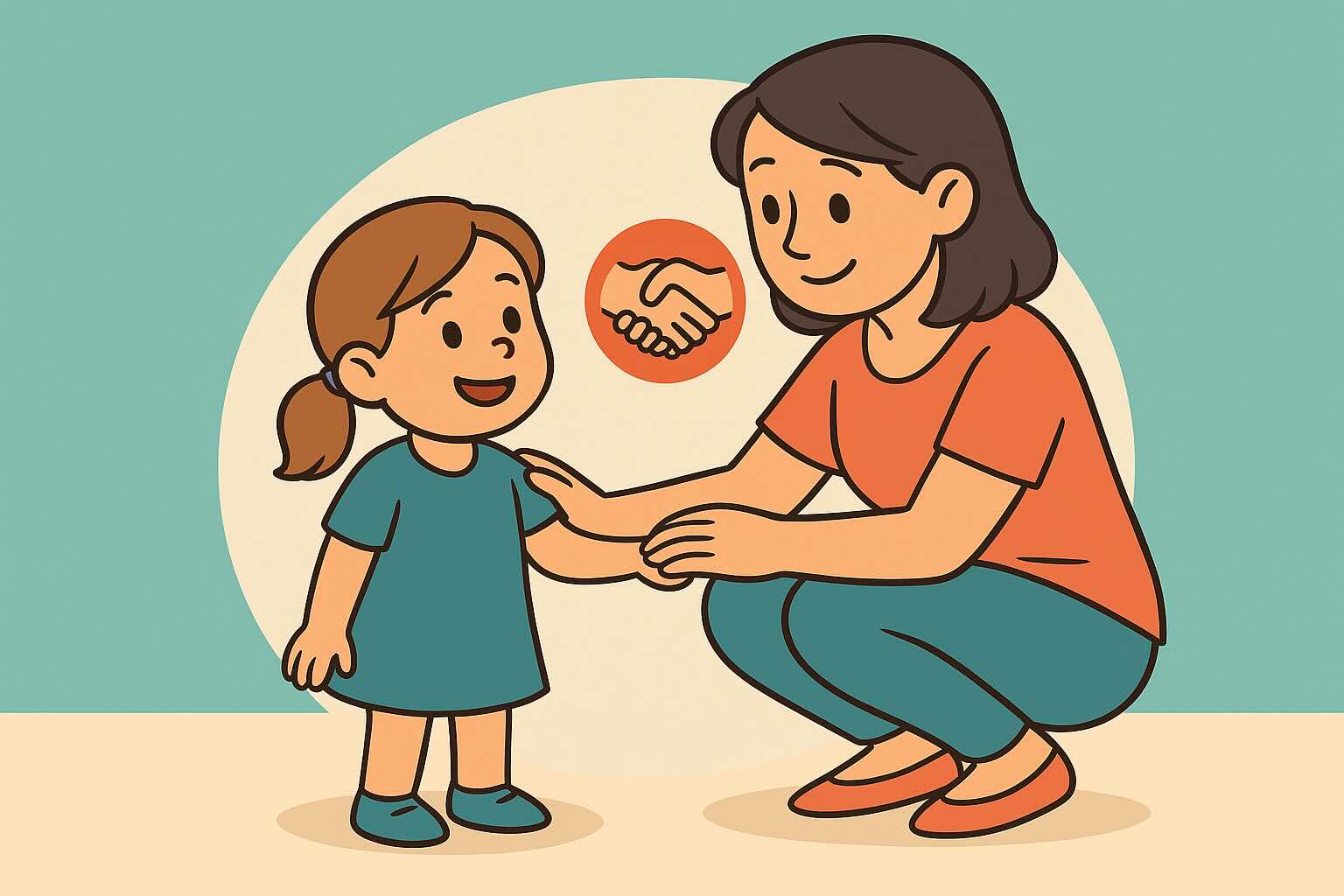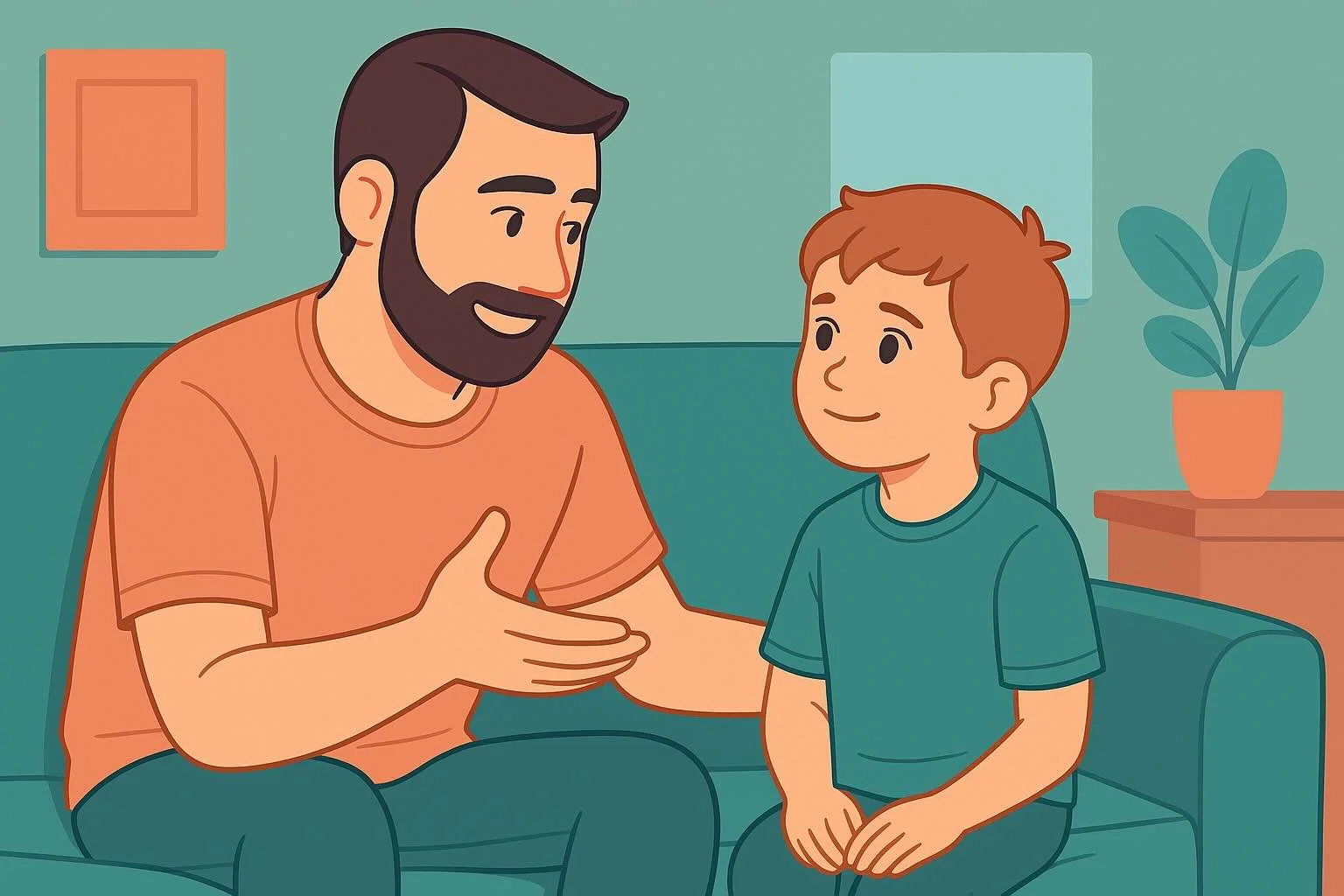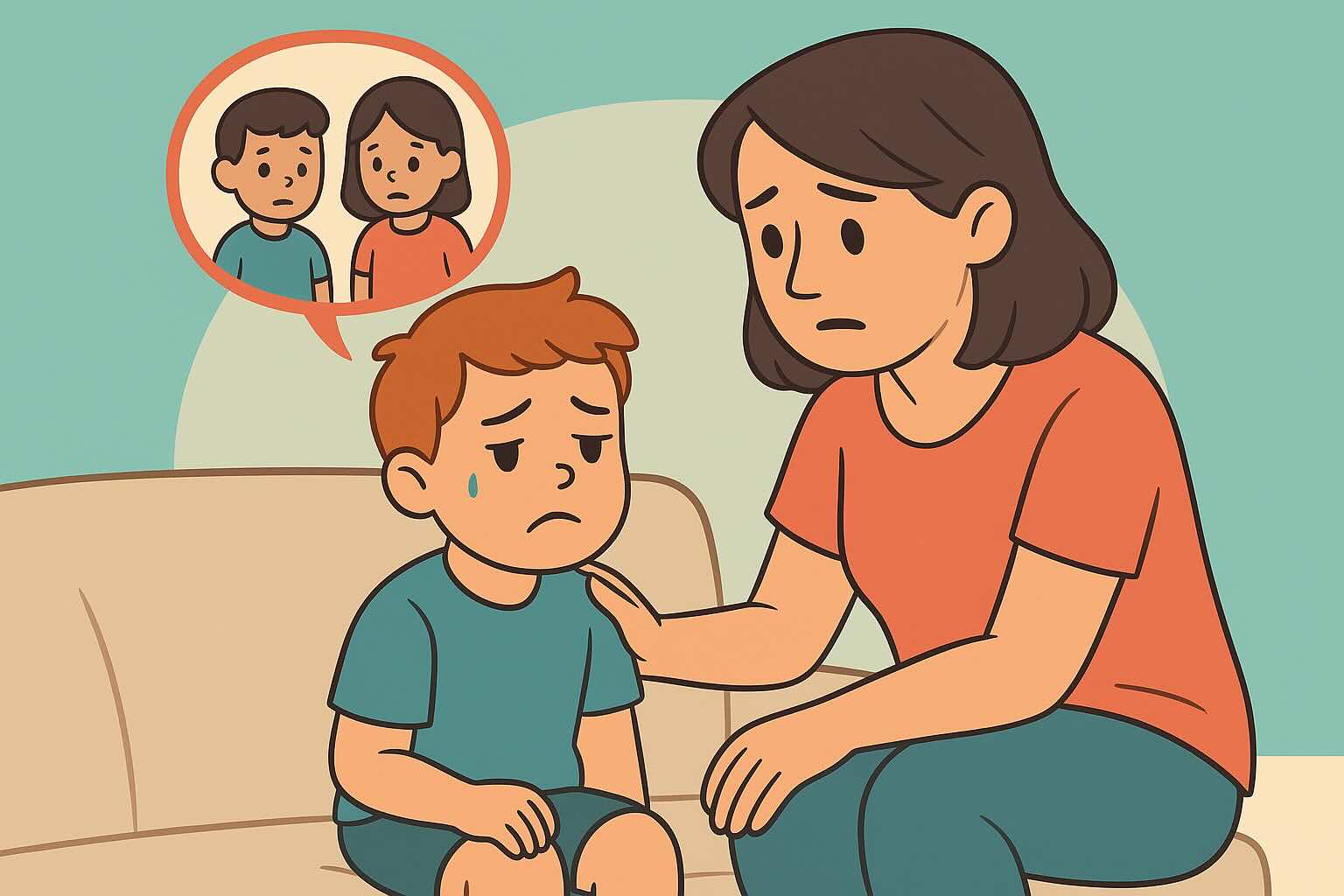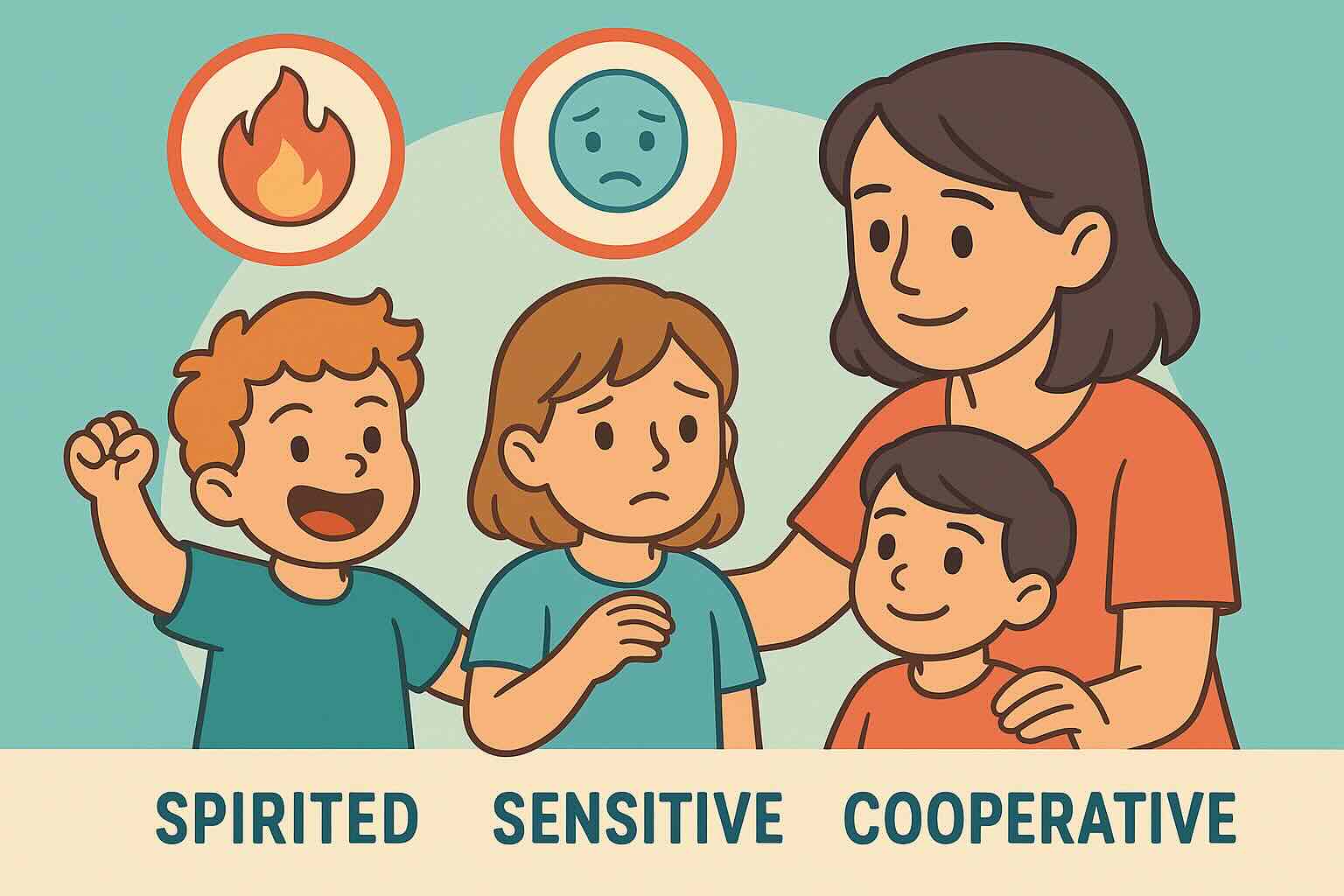The Cooperative Child: Building Boundaries and Self-Advocacy


The Cooperative Child: Complete Parent's Guide to Raising Agreeable Kids (Ages 3-7)
Helping Your Agreeable Child Find Their Voice
If your child is always the "good one" who never causes trouble, always goes along with others' plans, and seems to exist to make everyone else happy, you might wonder if this is actually a problem. The answer is: it can be, if they're losing their own voice in the process.
While cooperation and kindness are wonderful traits, children need to learn that they have choices, preferences, and the right to express them. Your naturally cooperative child can maintain their caring nature while also developing healthy boundaries and self-advocacy skills.
This comprehensive guide provides strategies specifically designed for cooperative, people-pleasing children aged 3-7. Learn how to help your agreeable child find their voice without losing their natural kindness and consideration for others.
For understanding your child's overall temperament, also check out our complete personality identification guide. You may also find our guides on supporting sensitive children and managing spirited children helpful for comparison. If your child is experiencing social challenges, our social misunderstandings guide provides additional support.
What You'll Learn in This Guide
- Understanding the Cooperative Child - Why they prioritize others' happiness and what they need
- The Good Child Syndrome - Recognizing when cooperation becomes problematic
- Teaching Healthy Boundaries - How to say no while staying kind
- Developing Their Voice - Encouraging opinions, preferences, and choices
- Social Skills for People-Pleasers - Navigating friendships without losing themselves
- Building Self-Worth - Helping them value their own needs and wants
- Long-Term Development - Raising caring leaders who can also stand up for themselves
Estimated reading time: 10 minutes
Understanding Your Cooperative Child: The People-Pleasing Temperament
The Cooperative Personality Profile
Your cooperative child is naturally wired to seek harmony and connection with others. They have an intuitive understanding of social dynamics and work hard to maintain peace and happiness in their relationships. This isn't learned behavior—it's their authentic temperament.
Common cooperative child characteristics:
- Naturally agreeable and harmonious
- Puts significant effort into making others happy
- Seeks to align themselves with others' preferences
- Rarely pushes back or causes conflict
- Seems to intuitively know what others want
- Appears easygoing and adaptable
- Often labeled as the "good" child
- Avoids disappointing others whenever possible
Why Your Child Seeks to Please
Neurological and temperamental factors:
- Social sensitivity: They're naturally attuned to others' emotions and reactions
- Harmony seeking: Their brain prioritizes connection and approval over individual desires
- Conflict avoidance: They experience stress when others are upset or disappointed
- Empathy drive: They genuinely care about others' feelings and happiness
It's important to understand: This isn't about being weak or lacking personality. Cooperative children have strong social intelligence and genuine care for others—traits that serve them well in many situations.
The Strengths of Cooperative Children
Natural social and emotional gifts:
- Exceptional empathy and emotional intelligence
- Strong cooperation and teamwork abilities
- Peacemaking and conflict resolution skills
- Adaptability and resilience in social situations
- Loyalty and deep care for relationships
- Intuitive understanding of group dynamics
- Natural helping and nurturing tendencies
Future advantages: Research shows that children with cooperative, agreeable temperaments often become:
- Excellent team players and collaborators
- Compassionate leaders who consider everyone's needs
- Skilled mediators and counselors
- Dedicated friends and partners
- Successful in careers requiring emotional intelligence
- Community builders and volunteers
- People who create positive, inclusive environments
The Good Child Syndrome: When Cooperation Becomes Problematic
Recognizing the Warning Signs
While cooperation is positive, the "good child syndrome" develops when children feel they have no choice but to please others, even at their own expense.
Concerning patterns to watch for:
- Never expressing preferences or opinions
- Automatically agreeing with whatever others suggest
- Seeming anxious when asked what they want
- Always being the one to compromise in conflicts
- Difficulty making simple choices (what to wear, eat, play)
- Appearing distressed when they can't make someone happy
- Taking responsibility for others' emotions
- Avoiding any behavior that might cause disapproval
The Hidden Costs of Constant People-Pleasing
Emotional and developmental risks:
- Loss of sense of self and personal identity
- Difficulty recognizing their own needs and wants
- Increased risk of being taken advantage of by others
- Development of anxiety around disappointing people
- Potential resentment that builds over time
- Difficulty making decisions independently
- Vulnerability to manipulation and bullying
The internal experience: Your cooperative child might be thinking:
- "I have to make everyone happy"
- "My feelings don't matter as much as others'"
- "If I disappoint someone, they won't like me"
- "Good children always do what others want"
- "I don't know what I want—what do others want?"
Reframing "Always" and "Never" Thinking
Cooperative children often think in extremes about being good:
- "I ALWAYS have to be nice"
- "I NEVER get to choose"
- "I ALWAYS have to say yes"
- "I NEVER want to upset anyone"
Your goal is to introduce "sometimes" thinking:
- "SOMETIMES I do what others want, and sometimes I share my own ideas"
- "It's okay to say no SOMETIMES, even to people I care about"
- "SOMETIMES people might be disappointed, and that's normal"
- "I can be kind AND have my own opinions"
Teaching Healthy Boundaries While Staying Kind
The Foundation: Choice Awareness
Help your cooperative child understand that being good is a choice, not an obligation, and that they can make different choices in different situations.
Conversation starters about choices:
- "Did you agree with your friend because you really wanted to, or because you thought you should?"
- "What would happen if you suggested a different game to play?"
- "Is there a difference between being kind and always saying yes?"
- "How do you feel when you always do what others want?"
Exploring the concept of boundaries:
- "Everyone has things they like and don't like—including you"
- "It's okay to have opinions that are different from your friends'"
- "You can be nice to someone and still disagree with them"
- "Good friends want to know what you think and feel"
Teaching "No" Skills in Safe Settings
Start practicing boundary-setting in low-stakes situations at home.
Safe practice opportunities:
- Food choices: "You don't have to eat everything on your plate"
- Activity choices: "You can choose not to participate in this family game"
- Clothing choices: "You can say no to wearing something you don't like"
- Affection choices: "You can choose not to hug someone if you don't feel like it"
Supportive responses when they say no:
- "I hear you saying no. That's okay."
- "It's good that you told me what you don't want."
- "You're allowed to have different preferences than me."
- "Thank you for being honest about how you feel."
Role-Playing Boundary Scenarios
Use pretend play to practice assertive responses in various situations.
Common scenarios to practice:
- Friend wants to play a game they don't enjoy
- Someone asks to borrow their favorite toy
- Peer is being bossy or demanding
- Group wants to do something they're not comfortable with
- Someone is treating them unfairly
Sample scripts to practice:
- "I'd like to try a different game"
- "I'm not ready to share that toy right now"
- "I don't feel comfortable with that"
- "That doesn't sound fun to me. What else could we do?"
- "I don't like when you talk to me that way"
The Kind "No" Formula
Teach your child they can decline while still being considerate:
The formula: Acknowledge + Decline + Alternative
- "I understand you want to play tag, but I'd rather do something quieter. How about we draw instead?"
- "Thanks for inviting me, but I don't want to climb that high. I'll cheer you on from here."
- "I can see you really want my cookie, but I'm saving it for later. Would you like some crackers instead?"
Developing Their Voice: Encouraging Preferences and Opinions
Creating Opportunities for Choice Expression
Daily decision-making practice:
- Let them choose first sometimes in family decisions
- Ask for their opinion on age-appropriate family matters
- Encourage them to suggest activities or outings
- Give them meaningful choices about their own life
- Ask "What do you think?" regularly
Choice-building conversation starters:
- "What's your favorite part of our day together?"
- "If you could plan our Saturday, what would we do?"
- "What do you think about this story/movie/situation?"
- "Which would you prefer, and why?"
- "What's your opinion on this?"
Helping Them Recognize Their Preferences
Cooperative children often genuinely don't know what they want because they're so focused on what others want.
Preference exploration activities:
- Notice what makes them light up and point it out
- Keep a family journal of things each person enjoys
- Try new activities and discuss their reactions
- Ask about physical sensations: "How does this feel in your body?"
- Help them notice when they're excited versus just compliant
Supportive observation language:
- "I noticed you really smiled when we did that activity"
- "Your face looked different when you were doing that—you seemed really happy"
- "You seemed disappointed when we stopped doing that"
- "I can tell you have strong feelings about this"
Encouraging Idea Sharing
In family settings:
- Ask for their input on family decisions
- Create space for their ideas during conversations
- Show genuine interest in their thoughts and opinions
- Thank them when they share ideas, even if you don't use them
- Model sharing your own thought process
In social settings:
- Encourage them to suggest activities to friends
- Practice conversation starters that share their interests
- Help them prepare one idea to contribute to group play
- Celebrate when they speak up in group situations
- Support them in taking turns being the leader
Building Opinion Confidence
Start with low-stakes opinions:
- Favorite colors, foods, animals, or characters
- Preferences about weather, seasons, or activities
- Thoughts about books, movies, or games
- Ideas about fair rules or solutions to problems
Gradually move to more complex topics:
- What makes a good friend
- How to solve conflicts fairly
- Ideas for family activities or traditions
- Thoughts about school experiences
- Opinions about community or world issues (age-appropriate)
Validating their voice:
- "That's an interesting way to think about it"
- "I hadn't considered that perspective"
- "You have good ideas about this"
- "I appreciate you sharing your thoughts with me"
- "Your opinion matters to me"
Social Skills for People-Pleasers: Navigating Friendships
Understanding Their Social Challenges
Cooperative children face unique friendship challenges because their natural inclination to please can sometimes work against healthy relationship development.
Common social patterns:
- Always going along with more assertive friends' choices
- Attracting friends who like to be in control
- Being overlooked in group decision-making
- Taking blame for conflicts to keep peace
- Struggling to express disappointment when hurt
- Having difficulty ending friendships that aren't healthy
Teaching Balanced Friendship Skills
The concept of friendship equality: Help them understand that healthy friendships involve give and take from both people.
Conversation topics about friendship balance:
- "In a good friendship, both people get to choose activities sometimes"
- "Friends should care about what you think and feel too"
- "It's okay if friends disagree sometimes—that's normal"
- "Good friends want you to be happy, not just make them happy"
- "You deserve friends who are interested in your ideas"
Recognizing one-sided friendships: Help them identify relationships where they're doing all the accommodating:
- "Do you always do what [friend] wants to do?"
- "Does [friend] ever ask what you'd like to play?"
- "How do you feel after spending time with [friend]?"
- "Do you feel like you can be yourself around [friend]?"
Practicing Assertive Friendship Skills
Taking turns being the leader:
- Practice at home with family activities
- Create games where leadership rotates
- Discuss what makes a good leader vs. a bossy leader
- Role-play suggesting activities to friends
- Celebrate when they take initiative in real situations
Sample scripts for friendship situations:
- When friend always chooses the activity: "I have an idea too. What if we try this?"
- When being pressured: "I'm not comfortable with that. Let's do something else."
- When feeling left out: "I'd like to join. What are you playing?"
- When disagrees with group: "I think differently. What if we tried it this way?"
- When friend is being mean: "I don't like when you say that to me."
Handling Social Conflicts
Teaching them it's okay to disagree:
- Model disagreeing respectfully in family conversations
- Discuss how different opinions make life interesting
- Practice saying "I see it differently" in comfortable settings
- Help them understand that conflict doesn't mean relationship failure
- Show them how to repair relationships after disagreements
Conflict resolution scripts:
- "I understand you want to do that, but I'd prefer something else"
- "Let's find something we both want to do"
- "That hurt my feelings. Can we talk about it?"
- "I'm sorry we disagreed. You're still my friend."
- "Maybe we can take turns choosing what to do"
Building Friendship Confidence
Helping them recognize their friendship value:
- Point out the positive qualities they bring to friendships
- Acknowledge when friends seek them out or enjoy their company
- Help them see how their kindness makes others feel good
- Celebrate their loyal, caring nature
- Remind them that they deserve good friendships too
Encouraging friendship diversity:
- Help them find friends with different personality types
- Support friendships with other gentle, kind children
- Encourage activities that highlight their strengths
- Create opportunities for them to be helpful leaders
- Support their natural inclination to include others
Age-Specific Strategies for Cooperative Children
Ages 3-4: Foundation Building
At this age, cooperative children are developing their understanding of self and relationships.
Effective strategies:
- Offer simple either/or choices throughout the day
- Notice and name their preferences when you see them
- Practice saying "no" in playful, safe contexts
- Read books about characters who speak up for themselves
- Model expressing your own preferences clearly
Common challenges and solutions:
- Always deferring to siblings: Create special one-on-one time where they choose everything
- Seeming to have no preferences: Start with very simple choices (red cup or blue cup)
- Automatic "yes" responses: Give them time to think before answering
- Distress when others are upset: Teach that others' feelings aren't their responsibility
Ages 5-7: Voice Development
Older cooperative children can understand more complex concepts about relationships and boundaries.
Effective strategies:
- Discuss the difference between being kind and being a pushover
- Practice assertive body language and tone of voice
- Role-play complex social scenarios with multiple solutions
- Encourage them to share their ideas in group settings
- Help them recognize and resist peer pressure
Common challenges and solutions:
- Being taken advantage of by peers: Teach them to recognize unfair treatment
- Difficulty with decision-making: Practice with increasingly complex choices
- Fear of disappointing others: Discuss how disappointment is a normal part of life
- Avoiding leadership opportunities: Create safe spaces for them to practice leading
Building Self-Worth Independent of Others' Approval
Developing Internal Validation
Help them recognize their own worth:
- Celebrate their accomplishments before asking if others noticed
- Ask how they feel about their work before asking about others' reactions
- Point out their positive qualities that aren't dependent on pleasing others
- Encourage activities they enjoy regardless of others' interest
- Help them set personal goals and celebrate achieving them
Internal validation conversation starters:
- "How do you feel about what you accomplished?"
- "What are you proud of about yourself?"
- "What do you like about who you are?"
- "What makes you feel good about yourself?"
- "What do you enjoy doing, even if no one else wants to?"
Teaching Emotional Independence
Understanding others' emotions aren't their responsibility:
- "You can't control how other people feel"
- "It's not your job to make everyone happy"
- "People have feelings for their own reasons"
- "You can be kind without fixing everyone's problems"
- "Sometimes people are disappointed, and that's okay"
Building emotional resilience:
- Discuss how everyone experiences disappointment sometimes
- Practice coping with others being upset without taking responsibility
- Help them understand that good relationships can handle disagreement
- Teach them that their worth doesn't depend on others' moods
- Model healthy responses to others' negative emotions
Encouraging Personal Identity Development
Exploring individual interests and talents:
- Support activities they show natural interest in
- Encourage them to develop expertise in areas they enjoy
- Celebrate their unique perspective and ideas
- Help them find their "thing" that brings them joy
- Support individual pursuits alongside social activities
Identity-building activities:
- Create an "all about me" book or poster
- Discuss family heritage and what makes them unique
- Encourage them to teach others about their interests
- Support creative expression and original ideas
- Help them recognize their special gifts and abilities
Avoiding the Cooperative Child Trap as a Parent
Being Mindful of Your Expectations
Common parenting traps with cooperative children:
- Always expecting them to be the "easy" one
- Asking them to accommodate siblings more than others accommodate them
- Taking their cooperation for granted
- Not checking in on their feelings because they don't complain
- Using their agreeableness to avoid dealing with more challenging children
Mindful parenting practices:
- Give them turns to choose first in family decisions
- Check in on their feelings regularly, even when they seem fine
- Thank them for their consideration rather than just expecting it
- Make sure they get equal consideration in family plans
- Advocate for their needs even when they don't ask
Balancing Family Dynamics
When you have both cooperative and demanding children:
- Make sure the cooperative child's needs don't get lost
- Teach all children to consider others, not just the cooperative one
- Give the cooperative child permission to speak up for themselves
- Don't always ask them to be understanding about others' behavior
- Create special time and attention for the cooperative child
Family meeting strategies:
- Make sure everyone gets to share opinions
- Practice taking turns choosing family activities
- Discuss fairness and what it means in families
- Celebrate when the cooperative child speaks up
- Address any unfair dynamics between siblings
Modeling Healthy Boundaries
Show them how to balance kindness with self-advocacy:
- Demonstrate saying no kindly but firmly
- Model expressing your own preferences and opinions
- Show them how to compromise without always giving in
- Let them see you stand up for yourself respectfully
- Discuss how you balance helping others with taking care of yourself
Long-Term Success: Raising Caring Leaders
What Healthy Development Looks Like
Signs of positive growth in cooperative children:
- Expressing preferences and opinions regularly
- Sometimes choosing their own interests over pleasing others
- Standing up for themselves when treated unfairly
- Maintaining their caring nature while having healthy boundaries
- Developing leadership skills that include others' input
- Forming balanced friendships with give and take
Emotional and social milestones:
- Can make decisions without excessive worry about others' reactions
- Expresses disappointment or disagreement appropriately
- Shows pride in their own accomplishments
- Helps others without feeling responsible for their emotions
- Maintains close friendships while being authentic to themselves
The Gift of a Cooperative Child
Your cooperative child's natural empathy and consideration are tremendous gifts that will serve them and the world well throughout their lives.
Long-term strengths they're developing:
- Exceptional emotional intelligence and social awareness
- Natural leadership that considers everyone's needs
- Strong collaborative and teamwork abilities
- Deep capacity for meaningful relationships
- Conflict resolution and peacemaking skills
- Genuine care and concern for others' wellbeing
- Ability to create inclusive, harmonious environments
Preparing Them for Future Success
Life skills for caring leaders:
- Decision-making confidence balanced with consideration for others
- Ability to stand up for themselves and others who need support
- Leadership styles that empower rather than control
- Strong sense of personal identity alongside social awareness
- Healthy boundaries that protect their energy and wellbeing
- Conflict resolution skills that honor everyone's needs
Key Takeaways: Your Cooperative Child Success Guide
- ✅ Cooperation is a strength when it's a choice - not when it feels like an obligation
- ✅ "Good" doesn't mean always saying yes - help them understand they have options
- ✅ Their voice matters too - encourage opinions, preferences, and ideas
- ✅ Healthy boundaries are kind - saying no can be caring for everyone involved
- ✅ Balanced friendships benefit everyone - teach them to seek mutual relationships
- ✅ Internal validation builds confidence - help them recognize their own worth
- ✅ Don't take their cooperation for granted - acknowledge and appreciate their accommodation
- ✅ Model healthy assertiveness - show them how to balance kindness with self-advocacy
- ✅ Their empathy is a gift - help them use it wisely without losing themselves
- ✅ Caring leaders change the world - they're developing skills the world desperately needs
Remember: You're not trying to make your cooperative child less caring or agreeable—you're helping them choose kindness from a place of strength rather than obligation. Their natural empathy and consideration for others are gifts that, combined with healthy boundaries and self-advocacy skills, will make them powerful forces for good in the world.
This guide is based on research in child temperament, social development, and healthy boundary formation. Individual results may vary based on family dynamics, child's specific needs, and consistency of approach. Consult with professionals if you have concerns about your child's social or emotional development.
Self-Care for Parents
Daily affirmations, guided meditations, and journaling tools to help you stay centered and emotionally balanced.

Social Skills Toolkit
Help your child navigate social challenges with resilience-building strategies, perspective-taking tools, and friendship skills.
Frequently Asked Questions
Need personalized support?
RootWise's AI coach can provide tailored strategies for your specific situation, available 24/7 when you need it most.
Learn More About AI Coaching →



